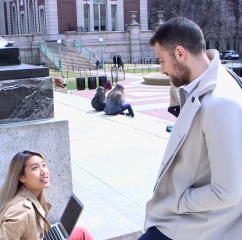A full scholarship to Columbia University changed that. She is studying for a master’s degree in economic political development, with a concentration in conflict resolution. She wants to work for the United Nations, to help children scarred by war.
“I needed this time to be outside — to see the conflict from outside,” she said.
On Wednesday, Columbia announced a global effort to help people like Sahtout — refugees and students displaced by wars and natural disasters. The Columbia University Scholarship for Displaced Students, underwritten with a commitment of up to $6 million a year, is the first of its kind in the world, university officials said. As many as 30 students a year who are admitted to any of the university’s undergraduate or graduate programs will have all of their education and living expenses covered.
There are more than 70 million people displaced, living as refugees or seeking asylum, according to the U.N., a historic figure that compelled the university to take action.
“The program sends a powerful message about the role that colleges and universities should be playing to help young people whose educations have been disrupted because they have been forced to flee violence and persecution in their home countries,” Columbia’s president, Lee Bollinger, said in a written statement. Bollinger led the creation of the initiative with Safwan M. Masri, executive vice president of Columbia Global Centers.
The university had been working with refugees around the world, Masri said, and decided to provide opportunities for outstanding students whose lives had been upended.
Participants in a pilot program that preceded the global initiative include Sahtout and six other Syrian students, including one who said he was detained and tortured. Masri said he hopes their desire to give back might have a ripple effect in their communities. “Every drop in the ocean matters,” he said.
Sahtout lived in Douma, a city near Damascus where people have endured violence, chaos and a reported chemical attack. She watched a bomb fall next to her house just after she stepped outside. She has been displaced 11 times.
Her mother left school when she was about 12 years old, and her father had not many more years of education, but Sahtout persisted with college classes despite the danger, and sought scholarships for graduate work.
When she arrived in New York in 2018 — her first time out of Syria, her first time traveling alone — she was frightened by loud noises from planes, construction, trucks.
After a few months, she came to realize, “I am in a safe place — I should not worry about this.”
She marveled at the city. “That’s really amazing for me, how people are from different backgrounds, different countries, and we are just living together peacefully.”
At Columbia, she has honed her studies and her internships to determine how to have an impact at home. In Syria, she could have eventually continued her study of economics, she said, but not with the humanitarian focus driving her now.
She can look back and see how traumatized she was in her first few months in the city. “Now, I have more of a clear mind to think about my education, to think about what I want to do,” she said. She misses working in the field, getting hugged by children happy to see her again. But she feels certain that when she goes back, she will have more ways to help them.
There are so many things she has learned at Columbia, she said, not least this: “Now, I know myself much better.”


